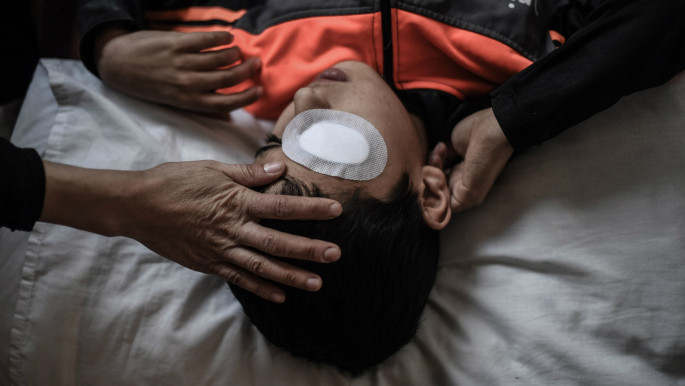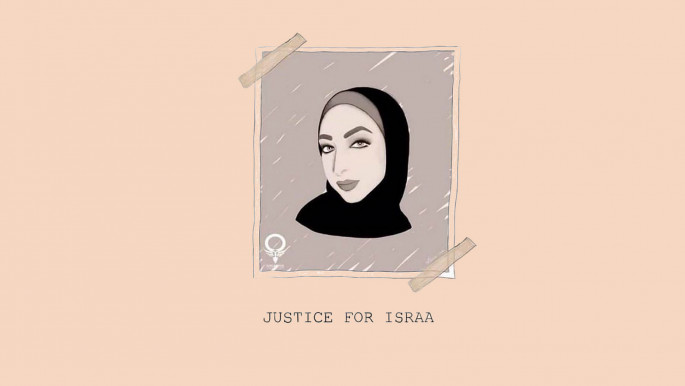Gaza's women entrepreneurs make it possible to send gifts to residents in the 'open-air prison'
Due to the Israeli blockade, getting personal items other than books into the Gaza Strip is next to impossible, unless they are carried in by returning Palestinians or internationals.
That means relatives and supporters can't celebrate special occasions with the people they love like most others in the world – by sending gifts. Until now, that is – thanks to four female entrepreneurs in Gaza who founded the online business Giftbox.
"The idea for the business came from having friends and relatives outside Gaza, who can't share important events and occasions with us because of closed borders," says Yasmin Sarsour, 35, an engineering graduate.
Joining Sarsour to found the business, with the help of funds from a startup incubator, were Soha Abu Alfoul a 34-year-old information technology department graduate; Islam Dahman, 24, who has a degree in business administration; and Noha Joma, 30, another IT graduate.
Sarsour is the general manager, Alfoul and Dahman select the items to be sold and Joma promotes the business on social media.
Customers can purchase gifts ranging from cakes and chocolates, to perfume, flowers, backpacks, miniature trucks and other toys.
If a customer has a specific item in mind that is not featured on the website, the women will secure it if it can be found in Gaza.
Finally, they personally deliver the item. If requested, they even will shoot a video of the gift being delivered and opened.
 |
They personally deliver the item. If requested, they even will shoot a video of the gift being delivered and opened |  |
Over the four years since its founding, most of the project's customers have come from the UAE and Saudi Arabia.
Giftbox is still not widely known, but one day, the women hope to establish more of a customer base in the West Bank, where the relatives of so many Gazans live.
Statistics show that Sarsour and her friends are doing more than fulfilling wishes and earning their own families additional income. In fact, according to a study by the International Monetary Fund, adding women to the workforce increases a country's GDP by an average of 35 percent.
 |
|
| Read also: 'Blinding the truth': Israeli snipers target Gaza protesters in the eyes |
In the Gaza Strip, where the economy is strangled by a decade-long Israeli blockade, a dearth of women in the workforce makes a bad marketplace even worse.
Abdullah Jamal Abullhanoud, PhD, professor of economics at the Arab College of Applied Sciences, rattles off alarming numbers: "Employment is very low for both men and women; you could almost say employment is absent," he says.
"But there is still a large disparity between the sexes: 43.5 percent of males are unemployed, compared to 74.5 percent for females. Unemployment is the highest among youth aged 15-24, and again you see the disparity: 65.3 percent for males and 92.2 percent for females."
 |
Employment is very low for both men and women; you could almost say employment is absent |  |
The reasons for this gender gap are varied: For example, the culture in Gaza is conservative; women often have a large number of children and shoulder the burden of their care, confining them to the home.
Even without multiple children, social norms in many communities dictate that women stay home. Likewise, some jobs in Gaza are not even open to women. According to the World Bank, females made up only 2.9 percent of all workers in medium-sized commercial enterprises.
Other male-dominated sectors include medicine (only 13 percent women) and law (23 percent).
That's why women in Gaza like Sarsour are becoming entrepreneurs. Another is Iman Abu Ali, 28, who has opened the first coffee shop just for women.
Read also: 'There is no freedom without free women': Palestinians worldwide demand end to domestic violence
Abu Ali lives in an area of the eastern Gaza Strip called Abasan, known for its rural conservatism. It is not considered acceptable there for women to mix with men they don't know in public, particularly social spots like cafes. So, one day she wondered to a friend, "Why don't we have a place for women to go to relax and chat with each other?"
She shared the idea with her husband, and he encouraged her to create such a business. Abu Ali's first step was to conduct some informal research: She queried women in Facebook groups and in local associations. They welcomed the idea.
"I completed a feasibility study and a marketing plan, then searched for funding," she says. "I went to associations, businesses and banks for months, but no one agreed to help me. I was about to cancel the idea, but my husband told me not to give up, that we could do it ourselves by paying suppliers in instalments."
 |
|
| Read also: The lethal cost of being a woman in Palestine |
However, not all men were as supportive as her husband. Other men in the neighbourhood complained to the municipality, demanding that her business licence be revoked, saying a woman-owned business was against local traditions. To allow these men to see her business for themselves, she agreed to open the café to families on Thursdays.
Abu Ali says, "I feel like a pioneer who has taken a first step so women can change society's traditions and thoughts about women's freedom."
On opening day for the Lamet Sabaya (young women gathering) Coffee Shop, customers packed the cafe, thrilled with the feminine décor, availability of WiFi – and the privacy. Word of mouth spread quickly.
Shaimaa Neal was one of the first customers. "It's a luxurious setting and the food is delicious. We women are over the moon there is such a special place for us."
Dr Abullhanoud notes that, "To increase women's employment, we must rejuvenate the labour market. The most obvious necessity is to remove the unnatural constraint of the Israeli blockade. But until then, we must invest as much as we can in the human element – and that means, in part, encouraging and supporting women's entrepreneurship."
Israa Jamal is a Gaza-based writer with WeAreNotNumbers.org and Pam Bailey is the founder of the youth storytelling project

![Palestinians mourned the victims of an Israeli strike on Deir al-Balah [Getty]](/sites/default/files/styles/image_684x385/public/2024-11/GettyImages-2182362043.jpg?h=199d8c1f&itok=xSHZFbmc)


![The law could be enforced against teachers without prior notice [Getty]](/sites/default/files/styles/image_684x385/public/2178740715.jpeg?h=a5f2f23a&itok=hnqrCS4x)
 Follow the Middle East's top stories in English at The New Arab on Google News
Follow the Middle East's top stories in English at The New Arab on Google News


